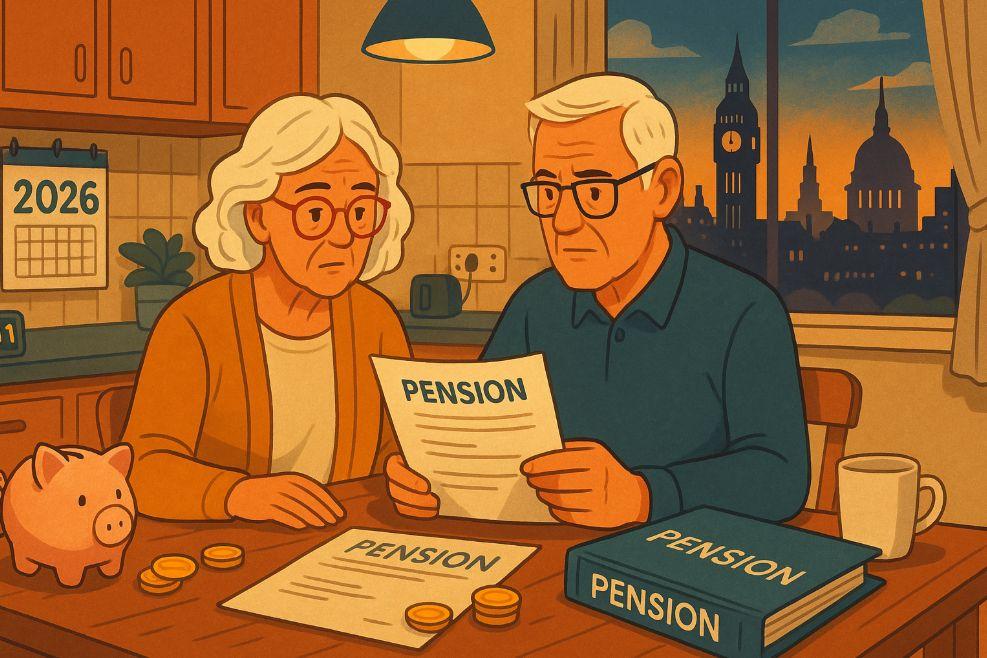The UK’s state pension system is undergoing further legislative change, and millions of future retirees will feel its impact. From 2026, the UK government through the Department for Work and Pensions (DWP) will begin gradually raising the state pension age, moving it from 66 to 67 over two years.
For many planning their retirement, these changes are more than just numbers they affect income timing, employment decisions, and financial security.
This blog breaks down everything retirees and working-age individuals need to know about the 2026 state pension age change, what’s driving it, and how to plan accordingly.
What is the DWP’s 2026 State Pension Age Change?

The DWP’s 2026 pension reform centres around raising the state pension age from 66 to 67 between 2026 and 2028. Individuals born between 6 April 1960 and 5 March 1961 will be directly impacted, as they’ll now need to wait beyond their 66th birthday to begin receiving the state pension.Instead, they will need to wait an additional 1 to 11 months, depending on their date of birth.
The move is part of an ongoing legislative adjustment to align the state pension system with increases in life expectancy and long-term economic sustainability.
Why is the UK Government Increasing the State Pension Age?
Life Expectancy and Demographic Shifts
The UK population is ageing. With people living longer, retirees are drawing their pensions for more years than in previous generations. When the state pension was first implemented in 1948, life expectancy in the UK was less than 70 years of age. Today, it’s closer to 82.
Economic Pressures and Public Spending
The retiree population in the UK is expanding more rapidly than the workforce contributing to the system through National Insurance. According to the Office for Budget Responsibility, state pension expenditure reached £112.5 billion in 2023, and this figure is expected to rise significantly. The government argues that increasing the pension age is necessary to maintain the system’s affordability.
Who Will Be Affected by the 2026 Pension Age Change?
Individuals Born Between 6 April 1960 and 5 March 1961
This group will experience the phased change in full. Instead of receiving the state pension at 66, they will become eligible between 66 years and 1 month and 66 years and 11 months, depending on their birthdate.
Future Generations
Anyone born after 5 March 1961 is already scheduled to retire at 67. Meanwhile, those born after April 1977 are expected to retire at 68, with further increases under consideration depending on future reviews.
When Exactly Will the New Pension Age Rules Take Effect?
The planned rise in the state pension age from 66 to 67 will be rolled out over a two-year period starting in April 2026 and ending in April 2028. Below is a consolidated table of state pension age changes by birth date, based on legislation passed under various UK Pensions Acts:
UK State Pension Age by Date of Birth (Legislated Schedule)
| Date of Birth | State Pension Age | Legislation Reference |
| 6 Apr 1950 – 5 Apr 1953 | 60–63 (phased monthly increases) | Pensions Act 1995 |
| 6 Apr 1953 – 5 Dec 1953 | 63–65 (phased monthly increases) | Pensions Act 2011 |
| 6 Dec 1953 – 5 Oct 1954 | 65–66 (phased monthly increases) | Pensions Act 2011 |
| 6 Oct 1954 – 5 Apr 1960 | 66 | Pensions Act 2011 |
| 6 Apr 1960 – 5 Mar 1961 | 66 + 1 to 11 months (phased) | Pensions Act 2014 |
| 6 Mar 1961 – 5 Apr 1977 | 67 | Pensions Act 2014 / 2007 |
| 6 Apr 1977 – 5 Apr 1978 | 68 (phased monthly increases) | Pensions Act 2007 (future) |
| 6 Apr 1978 onwards | 68 (expected; may rise further) | Subject to review & legislation |
Use the State Pension Age Calculator on GOV.UK to confirm your exact eligibility date.
How Will the State Pension Age Increase Impact Your Retirement Plans?

Delayed Access to State Pension
If you were planning to retire at 66 and were born after 6 April 1960, you’ll need to wait longer. This delay could impact retirement income unless you have private or workplace pensions to cover the gap.
Extended Working Years
Many individuals may need to continue working, potentially in part-time or flexible roles, until the new state pension age. Employers may need to support this with age-inclusive HR policies.
Financial Planning Implications
Those close to retirement must reassess income projections and possibly delay withdrawals from other savings. Financial advice is recommended to navigate these changes effectively.
What Are the New Eligibility Criteria for State Pension in 2026?
Qualification for the new state pension continues to depend on an individual’s National Insurance (NI) record.
Contribution Requirements
- To receive any state pension, a person must have at least 10 years of National Insurance contributions.
- For those aiming to receive the full weekly amount, a minimum of 35 qualifying years is required.
- Voluntary NI contributions can be made to fill gaps
As of the 2025/26 tax year, the full state pension is £221.20 per week, indexed annually to keep up with the cost of living.
Can You Still Retire Early Despite the Pension Age Rise?
Yes, early retirement remains an option, but it will not include access to the state pension until your qualifying age.
Relying on Private Pensions
You can begin drawing most private or workplace pensions from age 55 (rising to 57 in 2028). These may be used to bridge the income gap before state pension eligibility kicks in.
Savings and Investments
Those aiming to retire early should develop robust savings strategies, including ISAs, property income, or annuities, to support themselves during the interim years.
How Should You Prepare Financially for the 2026 Changes?

Check Your Pension Forecast
Use the State Pension Forecast tool on GOV.UK to see your projected pension and potential gaps.
Review Your NI Record
Ensure you have enough qualifying years. You can make Class 3 voluntary contributions to top up your record if needed.
Adjust Retirement Goals
Work with a financial planner to adapt your retirement date, saving targets, and investment portfolio to reflect the new age thresholds.
Are There Exceptions or Transitional Rules for Certain Groups?
While the pension age rules are applied broadly, some individuals may qualify for early support.
Health-Based Exemptions
If you’re unable to work due to illness or disability, benefits such as Personal Independence Payment (PIP) or Employment and Support Allowance (ESA) may be available before pension age.
Carers and Low Earners
You may receive NI credits if you are a full-time carer or a parent claiming child benefit, ensuring your pension record continues during unpaid work periods.
What Do Experts and Policy Analysts Say About the 2026 Pension Changes?

Think tanks like the Institute for Fiscal Studies (IFS) have raised concerns about fairness, especially for lower-income workers with shorter life expectancies. The government’s own reviews acknowledge these issues, prompting debates about a more flexible system.
Age UK, one of the country’s leading charities for older people, advocates for tailored retirement options, especially for those in manual labour who may not be able to work into their late 60s.
Snapshot of the 2026 Pension Age Change
- State pension age will increase from 66 to 67 between 2026 and 2028
- Affects individuals born 6 April 1960 – 5 March 1961
- Requires 35 years of NI contributions for full pension
- Use the State Pension Age Calculator to confirm your date
- Private pension access remains at 55–57, depending on legislation
Conclusion
The upcoming changes to the UK state pension age mark a significant shift in retirement planning for millions. As the DWP begins phasing in the new age threshold from 66 to 67 between 2026 and 2028, individuals nearing retirement must reassess their timelines, savings strategies, and income expectations. While the change is driven by demographic realities and long-term sustainability goals, it also places greater responsibility on individuals to prepare financially and make informed decisions about their futures.
Understanding when you qualify, how your National Insurance record affects your entitlement, and what alternatives are available such as private pensions or deferral options is essential. Whether you’re planning to retire soon or decades from now, staying proactive and informed will help ensure a smoother, more secure transition into retirement.
As further government reviews are expected, keeping up with the latest policy updates and financial advice is more important than ever. Retirement in the UK is evolving your preparation should evolve with it.
FAQs About DWP 2026 State Pension Age Change
What is the full new retirement age in the UK starting 2026?
It will increase to 67 in a phased approach from April 2026 to April 2028, depending on your birthdate.
Will National Insurance contributions requirements change?
No. You still need 10 years minimum for any pension and 35 years for the full pension.
How do the changes affect private pensions?
They are not directly affected, but individuals may need to rely on them more heavily if retiring before state pension age.
Are there any benefits for deferring your pension after 2026?
Yes. Deferring your pension increases your weekly payment by approximately 5.8% per year deferred.
How does the UK’s retirement age compare to other countries?
The UK’s retirement age is in line with many Western nations, including Germany and the US, both of which are also increasing their pension ages.
What can younger workers do to future-proof their pension plans?
Start saving early, monitor your NI contributions, invest wisely, and seek periodic financial advice.
Where can I get official updates about pension age changes?
Visit GOV.UK for tools, calculators, and updates from the DWP.









Leave feedback about this